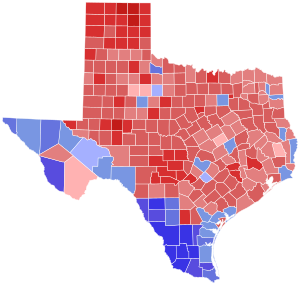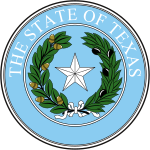2002 United States Senate election in Texas
| |||||||||||||||||
| |||||||||||||||||
 County results Cornyn: 50–60% 60–70% 70–80% 80–90% 90–100% Kirk: 40–50% 50–60% 60–70% 70–80% 80–90% | |||||||||||||||||
| |||||||||||||||||
| Elections in Texas |
|---|
 |
|
|
The 2002 United States Senate election in Texas was held on November 5, 2002. Incumbent Republican U.S. Senator Phil Gramm decided to retire, instead of seeking a fourth term. State Attorney General Republican John Cornyn won the open seat. This was the first open-seat election since 1984.
Major candidates[]
Democratic[]
- Ron Kirk, Mayor of Dallas
- Victor Morales, 1996 Senate nominee
- Ken Bentsen Jr., U.S. representative
Republican[]
- John Cornyn, Attorney General of Texas
General election[]
Campaign[]
Despite the fact that Texas is a red state, Kirk ran on a socially progressive platform: supporting abortion rights and opposing Bush judicial nominee Priscilla Owen, although Kirk was a former George W. Bush supporter.[1] He also supported increases in defense spending, such as Bush's proposed $48 billion increase in military spending, except for the money Bush wanted to use for missile defense.[2] Kirk had the support of former Governor Ann Richards and former U.S. Senator Lloyd Bentsen.
Cornyn was criticized for taking campaign money from Enron and other controversial companies. And although other Democrats have seized on the issue, Kirk is well-entrenched in the Dallas business community, and his wife resigned from two private-sector jobs that created potential conflicts of interest for Kirk while he was mayor.
An October Dallas Morning News poll had Cornyn leading 47% to 37%.[3] A record $18 million was spent in the election.[4]
Debates[]
- Complete video of debate, October 18, 2002
- Complete video of debate, October 23, 2002
Predictions[]
| Source | Ranking | As of |
|---|---|---|
| Sabato's Crystal Ball[5] | Lean R | November 4, 2002 |
Polling[]
| Poll source | Date(s) administered |
Sample size[a] |
Margin of error |
John Cornyn (R) |
Ron Kirk (D) |
Other / Undecided |
|---|---|---|---|---|---|---|
| SurveyUSA | October 29–31, 2002 | 683 (LV) | ± 3.9% | 53% | 45% | 2% |
Results[]
| Party | Candidate | Votes | % | ±% | |
|---|---|---|---|---|---|
| Republican | John Cornyn | 2,496,243 | 55.3% | +0.5% | |
| Democratic | Ron Kirk | 1,955,758 | 43.3% | -0.6% | |
| Libertarian | Scott Jameson | 35,538 | 0.8% | -0.1% | |
| Green | Roy Williams | 25,051 | 0.6% | ||
| Write-in | James W. Wright | 1,422 | 0.0% | ||
| Majority | 540,485 | 11.97% | |||
| Turnout | 4,514,012 | ||||
See also[]
- 2002 United States Senate election
Notes[]
- ^ Key:
A – all adults
RV – registered voters
LV – likely voters
V – unclear
References[]
- ^ "2002 VOTER'S GUIDE: / U.S. Senate / Cornyn vs. Kirk: More than U.S. Senate seat at stake here". Houston Chronicle. 27 October 2002. p. H.2. ProQuest 395977920.
- ^ http://infoweb.newsbank.com/iw-search/we/InfoWeb?p_product=NewsBank&p_theme=aggregated5&p_action=doc&p_docid=0F506C3B899A51C6&p_docnum=5&p_queryname=6
- ^ Cienski, Jan (31 October 2002). "Ethnicity, money are the recipe for 'Dream Team': Battle for Texas: Democrats court blacks, Hispanics in Republican state". National Post. Don Mills, Ont. p. A17. ProQuest 330127613.
- ^ "Center for Responsive Politics".
- ^ "Senate Races". www.centerforpolitics.org. November 4, 2002. Archived from the original on November 18, 2002. Retrieved June 25, 2021.
- ^ "2002 ELECTION STATISTICS".
- 2002 Texas elections
- 2002 United States Senate elections
- United States Senate elections in Texas

